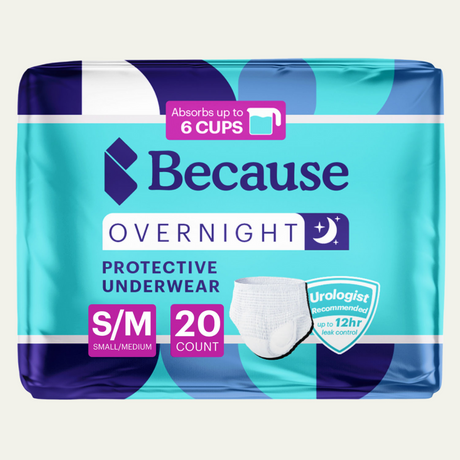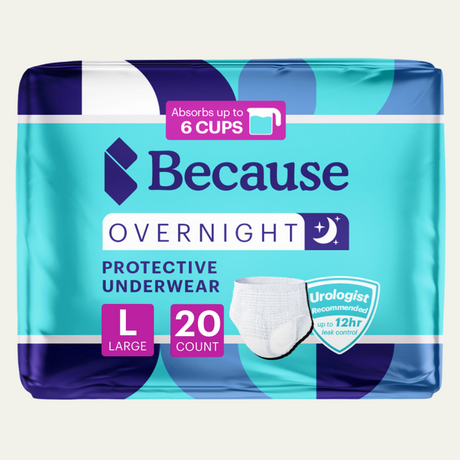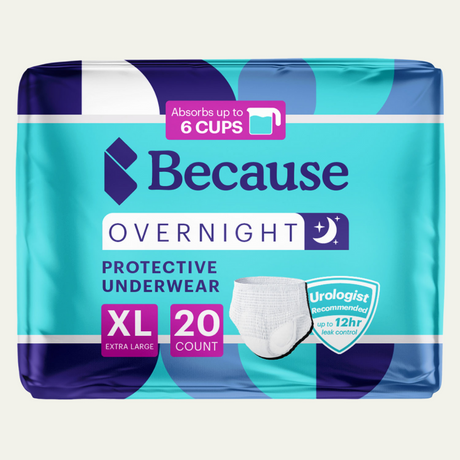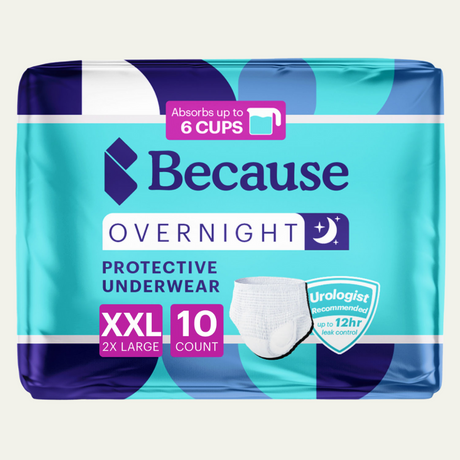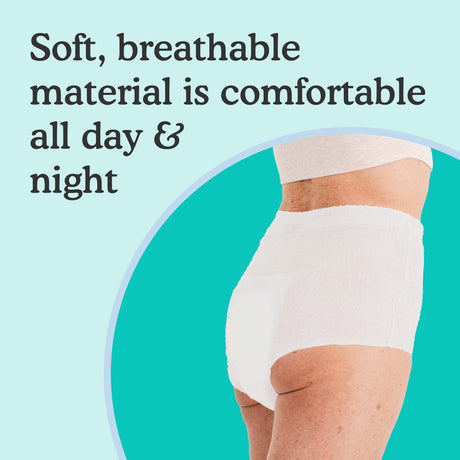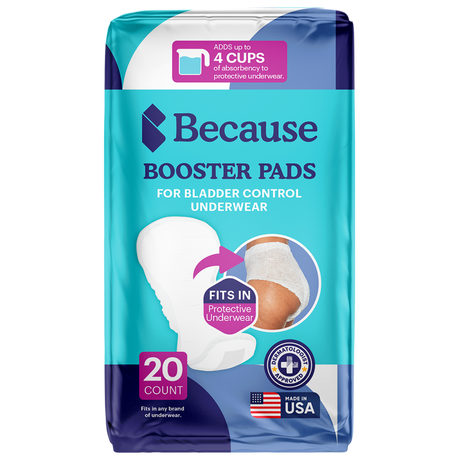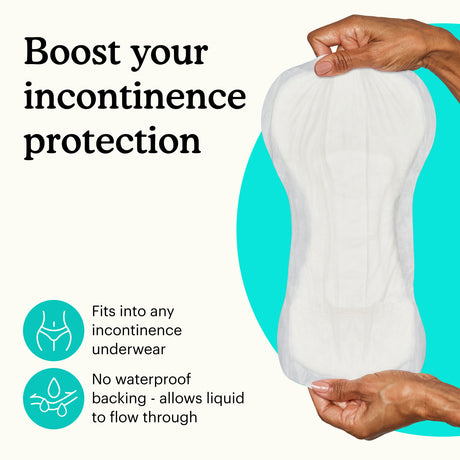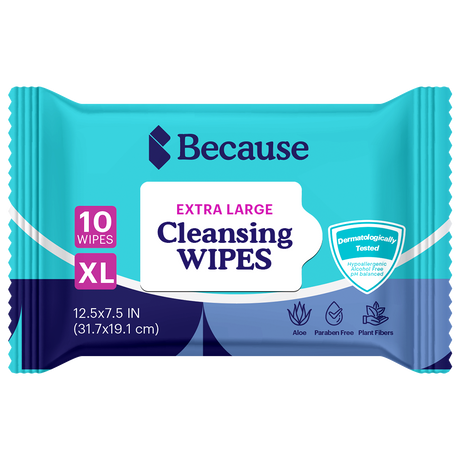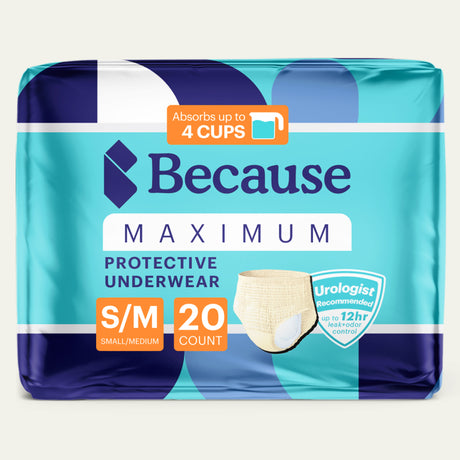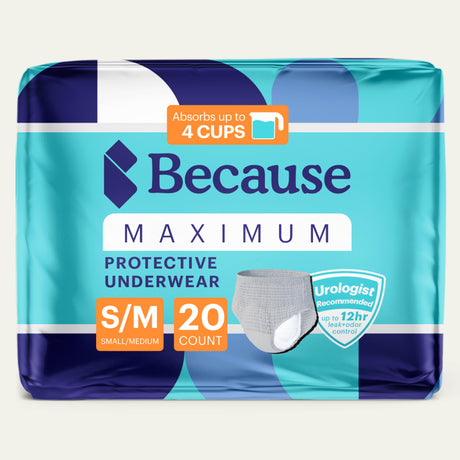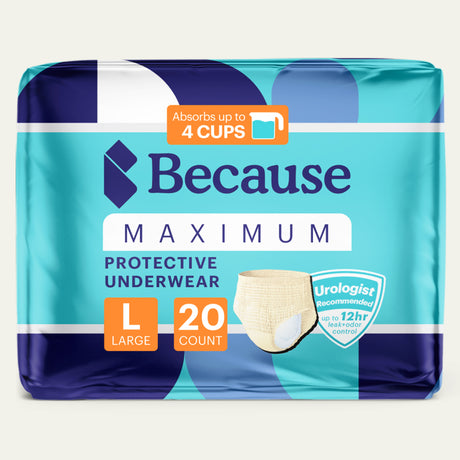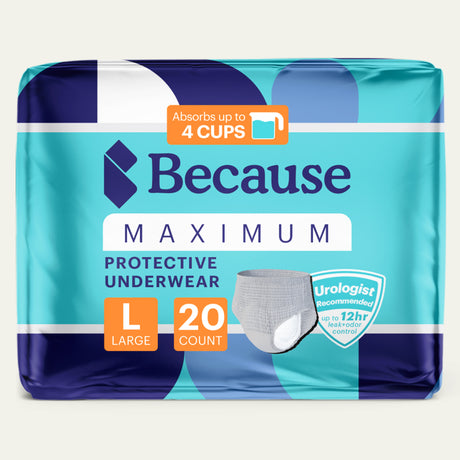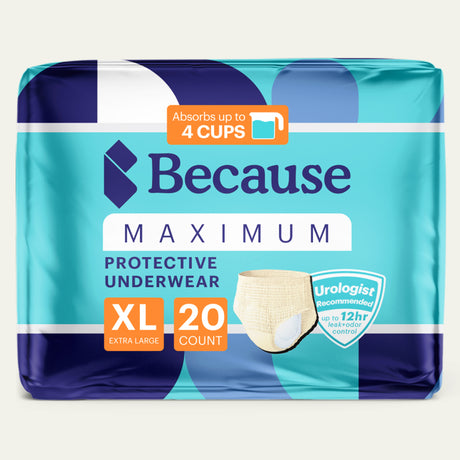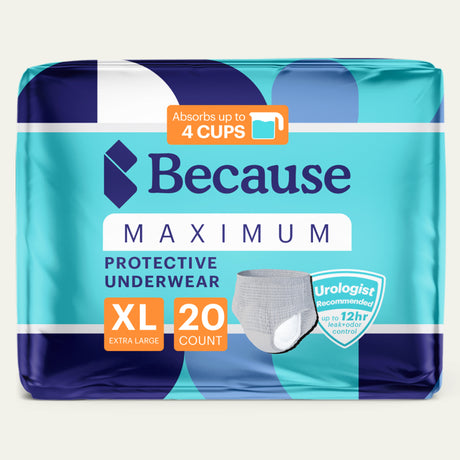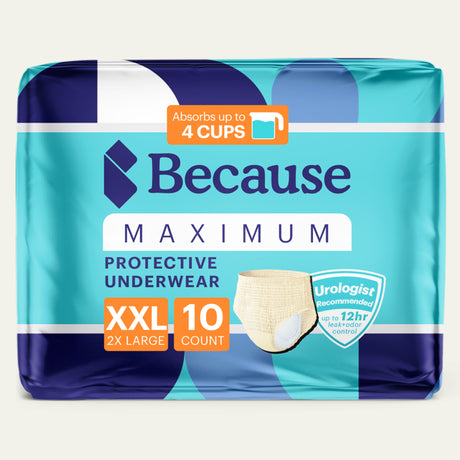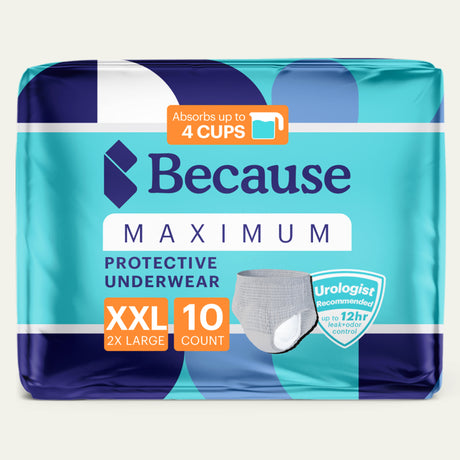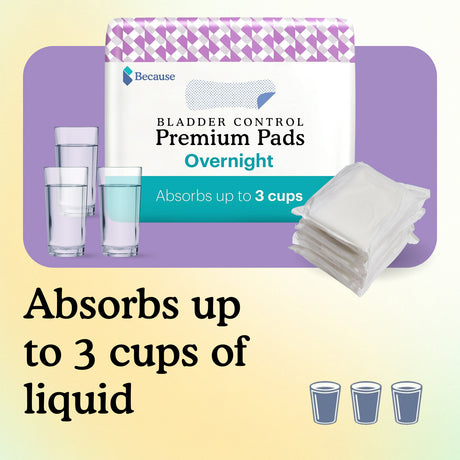Fecal incontinence (FI) is a challenging and often distressing condition that affects millions of people worldwide. While it can be embarrassing and feel difficult to talk about, understanding the different types of fecal incontinence, the available treatments, and high-quality products can empower individuals to seek the help they need. In this guide, we'll provide a comprehensive and clear overview of fecal incontinence, the various forms it takes, and your options for managing your symptoms to help you get the care and support you need to maintain quality of life.
Table of contents
What is Fecal Incontinence?
Fecal incontinence, also known as bowel incontinence or accidental bowel leakage, is the involuntary loss of stool or mucus due to an inability to control bowel movements. It can range from occasional leakage to a complete loss of bowel control. The severity and frequency of symptoms vary from person to person, often influenced by underlying medical conditions, nerve or muscle damage, and lifestyle factors.

4 Types of Fecal Incontinence
Fecal incontinence is not a one-size-fits-all condition. There are several distinct types, each with different causes and implications for treatment. The primary types of fecal incontinence include urge fecal incontinence, passive fecal incontinence, overflow fecal incontinence, and functional fecal incontinence.
1. Urge Fecal Incontinence
Urge fecal or bowel incontinence occurs when an individual experiences a sudden, strong need to defecate but is unable to reach a restroom in time. This type of fecal incontinence is often caused by:
- Weakness or dysfunction in the anal sphincter muscles or pelvic floor muscles
- Nerve damage, such as that from diabetes or multiple sclerosis
- Chronic diarrhea, which makes stool harder to control
Individuals with urge incontinence may feel the need to defecate but have difficulty delaying bowel movements, leading to accidents.
2. Passive Fecal Incontinence
Passive fecal incontinence refers to the involuntary passage of stool without the sensation of needing to go. People with this condition may not realize they have had an accident until after it occurs. Possible causes include:
- Severe nerve damage from conditions such as stroke or spinal cord injury
- Reduced rectal sensation due to aging or surgery
- Cognitive impairments such as dementia, which can affect bowel awareness
Absorbent incontinence products can be incredibly important and helpful for managing this type of bowel incontinence.
3. Overflow Fecal Incontinence
Overflow incontinence occurs when stool builds up in the rectum, leading to leakage of liquid stool around the impacted mass. This often happens in cases of chronic constipation where hard stool blocks normal bowel function. Symptoms include:
- Frequent staining or leakage of liquid stool
- A sensation of incomplete evacuation
- Abdominal discomfort or bloating
Overflow incontinence is more common in older adults and individuals with limited mobility or neurological conditions.
4. Functional Fecal Incontinence
Functional fecal incontinence is when an individual has normally functioning bowel control mechanisms but cannot reach the toilet in time due to physical, cognitive, or environmental barriers. Common contributing factors include:
- Mobility issues, such as those caused by arthritis or injury
- Cognitive impairments, such as those seen in Alzheimer's disease
- Psychological conditions, such as anxiety or depression, that interfere with timely toilet access
This type of incontinence highlights the importance of accessibility, support, and appropriate care for individuals with mobility or cognitive challenges.

Common Causes and Risk Factors of Fecal Incontinence
Fecal or bowel incontinence can result from a variety of medical and lifestyle factors, including:
- Anorectal Muscle Damage: The anorectal muscles, the anal sphincter, are crucial muscles that control the release of stool. Damage to these muscles can weaken bowel control, leading to leakage. Common causes include vaginal childbirth, rectal surgery, or trauma from accidents or chronic straining during bowel movements.
- Nerve Damage: Nerves that signal the need for a bowel movement or control the anal sphincter can become impaired due to conditions such as diabetes, multiple sclerosis, stroke, or spinal cord injuries. Childbirth-related nerve damage can also play a role, especially in prolonged labor or deliveries involving instrumental assistance.
- Diarrhea or Constipation: Chronic diarrhea results in loose stools that are harder to control, while long-term constipation can weaken rectal muscles and lead to overflow incontinence. Certain medications, dietary intolerances, and conditions such as Crohn’s disease or ulcerative colitis (a chronic, inflammatory bowel disease that causes inflammation in the colon and/or rectum) in can exacerbate these symptoms.
- Aging: As we age, muscle tone and nerve function naturally decline, making bowel control more difficult. Older adults may also experience decreased rectal sensation, which can delay the urge to defecate, leading to accidental leakage.
- Hemorrhoids: While hemorrhoids themselves do not directly cause fecal incontinence, severe or chronic hemorrhoids can contribute to symptoms. Large hemorrhoids may interfere with the ability of the anal sphincter to close properly, leading to leakage. Additionally, surgical removal of hemorrhoids or chronic straining due to hemorrhoidal discomfort can weaken the anal muscles, increasing the risk of incontinence.
- Medical Conditions: Underlying digestive disorders such as irritable bowel syndrome (IBS) and inflammatory bowel disease (IBD) can cause irregular bowel movements, increasing the risk of incontinence. Structural issues like rectal prolapse or previous pelvic surgeries may also contribute to weakened bowel control.
Fecal Incontinence Diagnosis and Treatment Options
Fecal incontinence can be effectively managed with the right combination of medical care, lifestyle adjustments, therapeutic interventions, and supportive products. Diagnosis typically involves a medical history review, physical examination, and tests such as anorectal manometry, endoanal ultrasound, or defecography to assess muscle and nerve function.
Non-Surgical Treatments
Many individuals with fecal incontinence find relief through non-surgical approaches, including:
- Dietary Changes: Increasing fiber intake to regulate bowel movements and reducing trigger foods
- Pelvic Floor Exercises: Strengthening the pelvic floor muscles and sphincter muscles through exercises like Kegels
- Medications: Anti-diarrheal drugs, stool softeners (laxatives), or bulking agents, depending on the type of fecal incontinence
- Anorectal Biofeedback Therapy: A bowel training technique that helps retrain the muscles involved in bowel control
Surgical and Advanced Treatment Options
For severe cases, surgical or procedural interventions may be necessary, such as:
- Sphincter Repair: Surgical correction of damaged anal muscles
- Sacral Nerve Stimulation (SNS): Electrical stimulation to improve nerve communication and bowel control
- Colostomy: A last-resort option where a surgical opening is created for stool diversion
Products to Help with Fecal Incontinence
If you’re experiencing bowel incontinence or are caring for someone who has bowel incontinence, there are several products that can help manage leaks and odors, improving comfort and confidence throughout the day and night. Learn more about how to choose the right bowel incontinence products for your needs.
Disposable Incontinence Underwear
One of the most effective tools for managing fecal incontinence is absorbent underwear or adult diapers. These products are designed to be worn discreetly under clothing and provide a barrier against leaks, preventing stains and odors, so you can focus on living and enjoying life. High-quality absorbent underwear can hold significant amounts of liquid, ensuring maximum protection. Take our fit quiz to find the right fit and absorbency level for your needs.
Incontinence Products Disposal
Disposing of soiled bowel incontinence products discreetly is essential for maintaining hygiene and comfort. Our disposable bags are designed to contain odors from urine or stools and are made from opaque materials to offer privacy and discretion.
Skin Care Products
Prolonged exposure to stool and wetness can cause skin irritation and increase the risk of infections. Proper skin and personal care products are crucial for those managing bowel incontinence.
Cleansing Wipes and Sprays: Gentle, non-drying wipes and no-rinse sprays help clean the skin without irritation. Look for options that contain soothing ingredients like aloe and vitamin E to prevent discomfort.
Bed Protectors
For individuals who experience nighttime urinary or bowel incontinence, bed protectors offer an extra layer of security. Waterproof backing layers and absorbent top sheets combine to help prevent damage to bedding and furniture. A highly versatile product, bed protectors are suitable for use on beds, sofas and armchairs, and even car seats for additional protection while traveling.
Consulting with Your Doctor about Bowel Incontinence
If you are experiencing bowel incontinence, it’s important to speak with a doctor, especially if:
- Symptoms persist or worsen over time
- You notice blood in your stool or experience severe pain
- Bowel incontinence is affecting your quality of life, social interactions, or emotional well-being
- You have a history of digestive disorders or recent surgery that may be contributing to symptoms
Early medical consultation can help identify underlying causes and allow for effective treatment before symptoms become more severe. Your doctor can conduct tests to determine the cause of your bowel incontinence and recommend appropriate treatment. Whether through dietary adjustments, medications, pelvic floor therapy, or surgical options, a tailored treatment plan can significantly improve symptoms and elevate your quality of life.
Living with Fecal Incontinence
Although fecal incontinence can be life-altering and feel embarrassing at first, many individuals successfully manage their symptoms and regain confidence through proper treatment and lifestyle adaptations. Support groups, counseling, and open discussions with healthcare providers can help reduce the stigma and improve emotional well-being.
Join our support groups that provide guidance and community for men and women experiencing bowel incontinence:
If you or a loved one is experiencing fecal incontinence, know that help is available. Seeking medical advice and exploring treatment options can lead to significant improvements in quality of life.
Related Reads
Sources
Agency for Healthcare Research and Quality. Treatment options for fecal incontinence: A review of the research for adults. U.S. Department of Health and Human Services. https://effectivehealthcare.ahrq.gov/products/fecal-incontinence/consumer
Mayo Clinic. (2024). Fecal incontinence: Symptoms & causes. Mayo Foundation for Medical Education and Research. https://www.mayoclinic.org/diseases-conditions/fecal-incontinence/symptoms-causes/syc-20351397
National Association for Continence. Could hemorrhoids be contributing to my fecal incontinence? https://nafc.org/bhealth-blog/could-hemorrhoids-be-contributing-to-my-fecal-incontinence/
National Institute of Diabetes and Digestive and Kidney Diseases. Definition & facts for bowel control problems (fecal incontinence). U.S. Department of Health and Human Services. https://www.niddk.nih.gov/health-information/digestive-diseases/bowel-control-problems-fecal-incontinence/definition-facts
National Institute of Diabetes and Digestive and Kidney Diseases. Symptoms & causes of bowel control problems (fecal incontinence). U.S. Department of Health and Human Services. https://www.niddk.nih.gov/health-information/digestive-diseases/bowel-control-problems-fecal-incontinence/symptoms-causes
National Institute of Diabetes and Digestive and Kidney Diseases. Treatment for bowel control problems (fecal incontinence). U.S. Department of Health and Human Services. https://www.niddk.nih.gov/health-information/digestive-diseases/bowel-control-problems-fecal-incontinence/treatment








